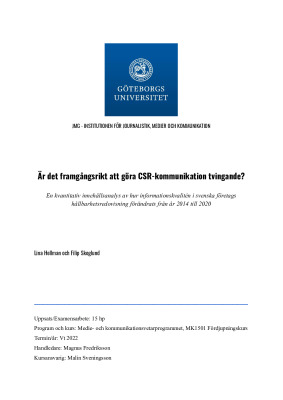Är det framgångsrikt att göra CSR-kommunikation tvingande?
En kvantitativ innehållsanalys av hur informationskvalitén i svenska företags
hållbarhetsredovisning förändrats från år 2014 till 2020
Executive summary
Is it successful to force CSR-communication?
As the environmental crisis is becoming increasingly urgent, the world is taking precautions to prevent the crisis from escalating into a point of no return. One example of this is the directive 2014/95/EU, which was formulated to make companies provide high-quality environmental disclosures for stakeholders to rely on. Sweden implemented the directive in
2017, which constitutes the legal context of environmental disclosures which this study explores. The purpose of this study is to investigate whether the quality of information in corporate sustainability disclosures has changed in connection with the introduction of the Swedish Environmental Reporting Act from 2017, in a comparison between the year 2014 and 2020. To analyze information quality in environmental disclosures, the theory of informativity was used. Informativity denotes a set of principles that evaluates the quality of information, these are scope, frequency, width and depth. These aspects establish the foundation onto which this study theoretically relies on. With respect to this theoretical framework, a quantitative content analysis consistent of 12 variables was used to determine the quality of information in corporate environmental disclosures. Thereafter a number of six
public Swedish companies were selected from the consumer staples sector. The study found that the scope of information relating to CSR had increased. The scope of information regarding environmental issues drastically increased, the scope of information regarding corruption and human rights also increased, whilst the scope of information regarding social sustainability drastically decreased. The width and depth of information also decreased from 2014 to 2020, whilst the frequency of information had increased. This means that environmental matters are given more space, and the entire field CSR-information is also given more space in 2020 in comparison to 2014. The quality of information did slightly increase from 2014 to 2020, but not significantly enough to conclude that the Environmental Reporting Act has had an effect. This study concludes that the Environmental Reporting Act
didn’t have a significant effect on the quality of information in corporate environmental disclosures.
Key words: Informativity, Quality of information, Sustainability Disclosure, Directive
2014/95/EU

